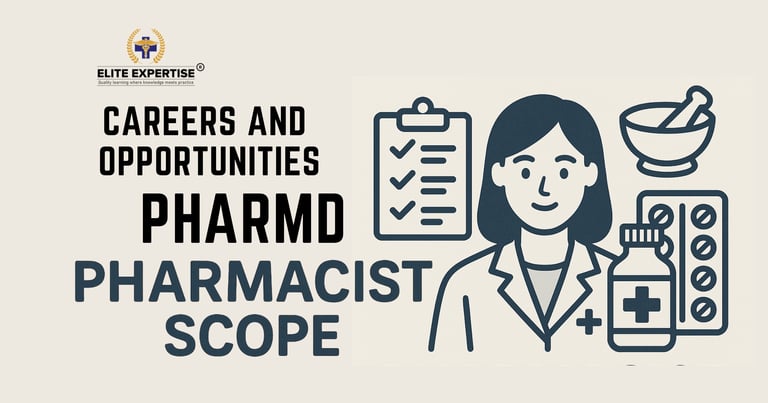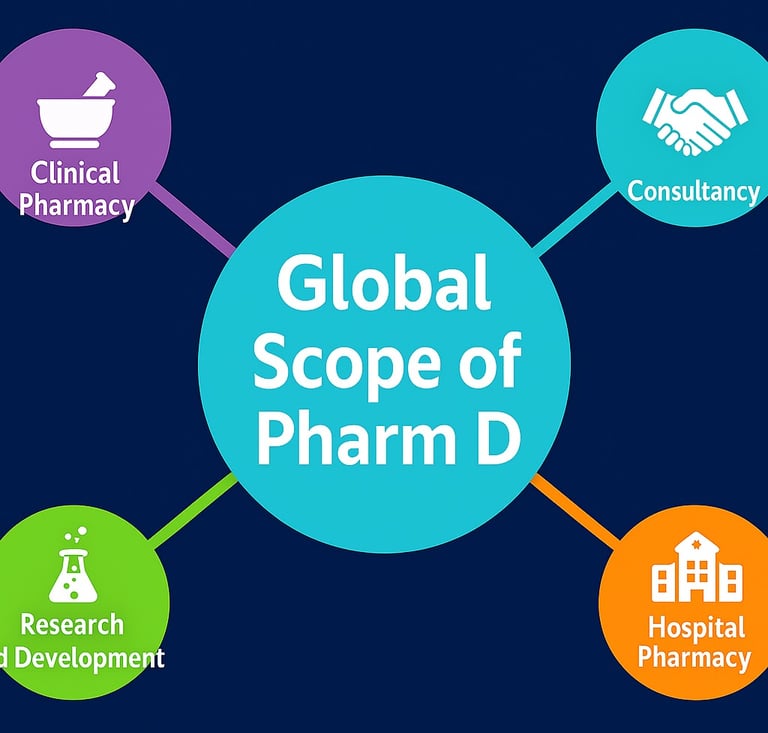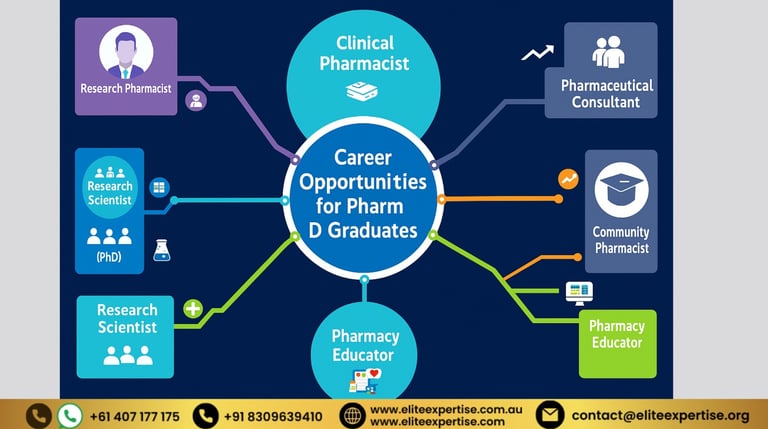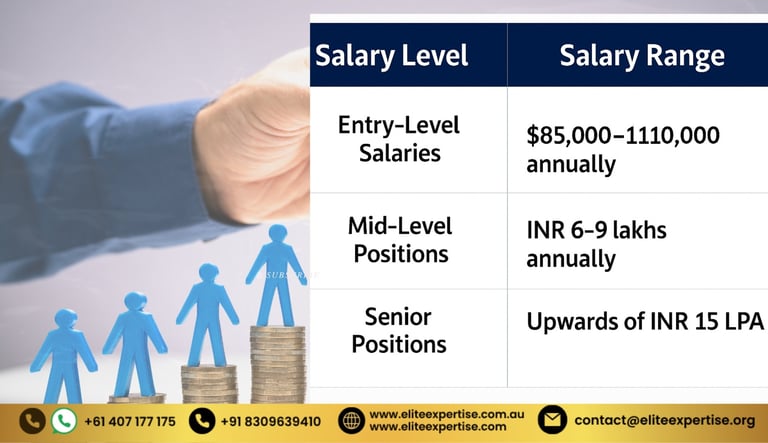ASK MY PHARMACIST | GOT QUESTIONS? Your pharmacist has answers. Click Here
What is the Scope of PharmD in 2025: Careers and Opportunities
PharmD in 2025: Is it worth it? See what careers, countries, and exams like OPRA & PEBC await you after graduation
Krupa
8/2/20254 min read


The Doctor of Pharmacy (Pharm.D) is a pharmacy degree designed to prepare students for advanced roles in clinical practice and patient care. The Pharm D course is a professional doctoral program in pharmaceutical education that equips students with the knowledge and skills required for diverse healthcare careers.
Pharm.D is a six-year program combining academic study and clinical training.
Covers pharmaceutical sciences, pharmacology, medicinal chemistry, and clinical pharmacy. Foundational subjects such as human anatomy and pharmaceutical science are integral parts of the Pharm D program, providing essential knowledge for clinical practice and patient care.
Clinical pharmacists optimize medication therapy and manage complex drug regimens.
Pharm D graduates are integral members of the healthcare team, working collaboratively to improve patient outcomes.
PharmD degree offers advanced clinical roles and professional recognition.
Focuses on medication therapy management and patient-centered care.
Ideal for those dedicated to patient safety and healthcare quality.
Eligibility Criteria
To pursue a Pharm.D course, candidates must meet specific eligibility criteria:
Completed 10+2 education with science subjects: Physics, Chemistry, and either Biology or Mathematics.
Minimum 50% marks in these subjects (varies by institution).
Some colleges may require specific subjects like pharmaceutical inorganic chemistry or pharmaceutical organic chemistry.
Eligibility may depend on entrance exam requirements; review college prerequisites before applying.
It is important to choose a reputable college of pharmacy to ensure quality education, strong clinical exposure, and better career prospects.
Pharm D course fees vary:
Pharm D fees can differ significantly depending on the college of pharmacy and its location, with factors such as tuition, scholarships, and institution type affecting the total cost.
Private colleges often charge higher fees, up to ₹15–18 lakhs for the full course.
Government colleges generally offer more affordable fees.
Check the official fee structures of each pharmacy college before applying.
Choose recognized pharmacy colleges in India for quality education, clinical training, and better job opportunities in the pharmaceutical and healthcare sectors.
Entrance Exams for Pharm D in India
Required Skills for Pharm D course
Success in a Pharm D program requires a combination of strong academic knowledge and practical skills. Aspiring clinical pharmacists need excellent communication, analytical thinking, and attention to detail to ensure patient safety and optimize medication therapy. A solid foundation in pharmaceutical sciences and the ability to adapt to fast-paced clinical settings are essential for delivering effective patient care and improving outcomes throughout their careers.
Benefits of Pursuing a Pharm D Course
Earning a Pharm D degree opens diverse career opportunities in healthcare.
Clinical pharmacists work directly with patients to optimize medication therapy and improve health outcomes.
Pharm D graduates are in demand in hospitals, clinics, and community pharmacies.
Graduates can pursue careers in clinical research, the pharmaceutical industry, and academia.
Pharm D education prepares for roles in drug development, clinical trials, and innovative therapy creation.
Pharm D professionals play a central role in advancing healthcare, research, and the pharmaceutical industry, driving industry growth and expanding employment opportunities.
Global Scope & Job Opportunities of Pharm D


Career Paths in the Healthcare Sector
Pharm D graduates have diverse career opportunities in healthcare, including roles as clinical pharmacists in hospitals and community pharmacies, positions in pharmaceutical companies focusing on research, development, and regulatory affairs, and jobs in government agencies and research organizations. They can also pursue academic careers or work as medical writers, making the Pharm D degree versatile and suited to various professional interests.


Career Opportunities and Development
Pharm D graduates enjoy diverse career opportunities and growth potential, including:
Careers in hospitals, the pharmaceutical industry, research & development, regulatory affairs, and academia.
Advancement to leadership roles, such as a quality assurance manager.
Specialized roles like a medical writer
High demand for clinical pharmacists focused on patient-centered care and medication optimization.
Top Recruiters in the Pharmaceutical Industry
Salary Range of a PharmD Graduate


Courses after the Pharm D course
Specialized training options include clinical research, pharmaceutical sciences, and business management.
Obtain credentials like Certified Clinical Pharmacist (CCP) or Board of Pharmacy Specialties (BPS) for professional credibility.
Consider master’s or doctoral degrees for academic or research career advancement.
Scope of Pharm. D. Graduates Overseas-Licensing exams & career paths
Conclusion
The Pharm.D degree opens the door to a diverse and dynamic range of career opportunities, both in India and abroad. With strong foundations in clinical pharmacy, therapeutics, and patient-centered care, Pharm.D graduates are well-equipped to work in hospitals, community pharmacies, research institutions, academia, regulatory bodies, and the pharmaceutical industry. The growing emphasis on evidence-based medicine and personalized healthcare has further increased the demand for skilled clinical pharmacists worldwide. Whether it's through global licensure pathways like PEBC (Canada), OPRA (Australia & New Zealand), or PSI (Ireland), Pharm.D holders have multiple options to establish a rewarding international career. As healthcare systems continue to evolve, the scope for Pharm.D professionals will only expand, making it a future-ready and globally respected qualification


About the Author
Krupa Karamchand
Content Writer | Elite Expertise
Krupa Karamchand is a B. Pharm graduate and KAPS-qualified pharmacist with over 7 years of experience in the pharmaceutical field. As an experienced SEO content writer, she combines her in-depth healthcare knowledge with proven digital strategies to create informative, engaging, and search engine–optimized blogs. Krupa is passionate about making complex medical topics easy to understand and accessible to all readers.
Follow On
Follow Us
+91 76750 84909
Privacy Policy | © 2025 Elite Expertise . All Rights Reserved.
ELITE EXPERTISE PTY. LTD (ABN: 15668292439) (ACN: 668292439)
Australian Statutory Education License: OPP 2025 ELITE EXPERTISE PTY. LTD
Disclaimer
Elite Expertise is an online education platform dedicated solely to providing coaching and preparation services for the OPRA, PEBC, PSI and PTE exams. We do not offer any sponsorship or migration services. All information provided on our platform is for educational purposes only and should not be interpreted as legal or immigration advice. For inquiries regarding sponsorship, visa applications, or migration services, please consult with licensed immigration professionals or relevant authorities.
Elite Expertise is a trusted and results-driven training platform specializing in preparation for international pharmacist licensing exams. Our comprehensive courses, expert instructors, and proven methodologies have helped countless pharmacy professionals achieve their goals and succeed in competitive regulatory exams. We are proud of our strong success rate and commitment to excellence.
Elite Expertise is an independent training provider. We are not affiliated with any global pharmacy regulatory authorities or official exam-conducting bodies.
Copyright © 2025 Elite Expertise. All rights reserved.
Address
Unit 1/73 Beverley St, Doncaster East VIC 3109, Australia
